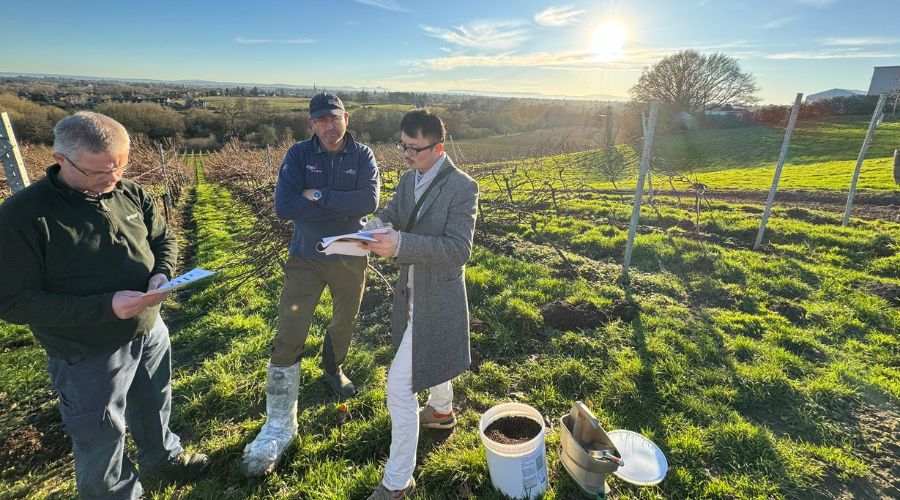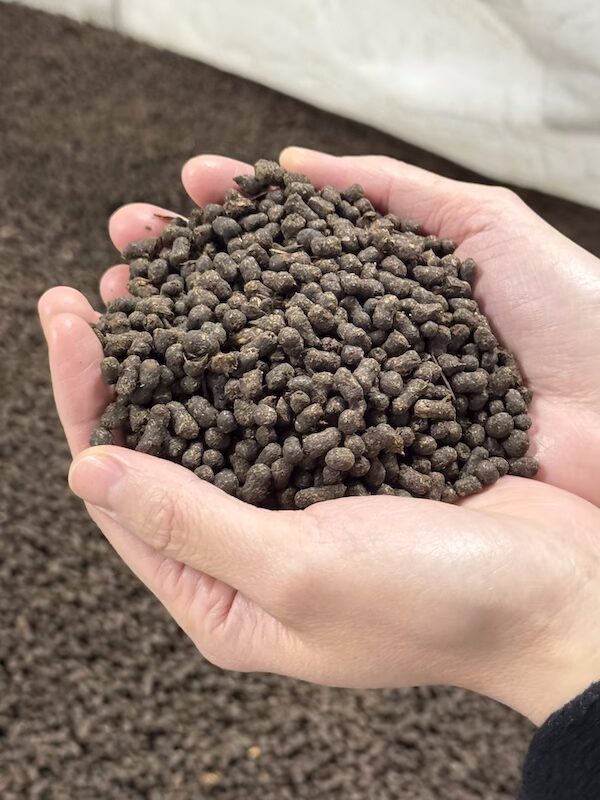Innovative organic fertiliser proves to be a hit with UK vineyards
20th June 2025
Lohas fertilisers are produced in the UK using enzyme technology to turn animal by-products into safe, low carbon fertilisers – with dramatic results for soil health on vineyards.

In the world of viticulture, soil health is a cornerstone of quality wine production. Forward-thinking vineyards across the UK are increasingly turning to Lohas Fertiliser – an innovative, sustainable solution that combines science with nature to nurture stronger vines and healthier soils.
Fruit & Vine spoke to Lohas founders, and husband-and-wife team Lian Lin and Carlos Kao to learn more. The fertilisers are manufactured using proprietary enzyme technology to break down organic materials and unlock nutrients in a form that vines can easily absorb.
This enzymatic approach creates a clean, stable product rich in beneficial fungi, amino acids, and micronutrients – ideal for improving soil structure, increasing microbial biodiversity, and enhancing nutrient uptake, they explained.
“Vineyards don’t just need fertiliser – they need smart nutrition,” Lian added. “Our technology enables us to produce a fertiliser that delivers results without compromising the balance of the ecosystem.”
Early adopters
Shropshire-based Hencote Vineyard started using Lohas fertilisers in 2021 to help address the balance of nutrients in their soils. After two consecutive years of using the product, soil quality has improved so much they no longer needed corrective nutrition as the balance is restored.
The vineyard’s winemaker, Gavin Patterson, notes that application rates are impressively low – just 100g per vine – yet the results have been significant and sustained.
“Lohas have enthusiastically taken time to understand our particular requirements and tailored a programme to suit. We have since collaborated to develop a product more suited to maintenance of soil condition for quality grape production at its core,” he said.
Stand-out features
One of the stand-out features of the product is that it’s odourless, because of the fermentation process.
Additionally, the products have a very low carbon footprint.
Lian added: “It’s all about turning waste into resources and producing this very low carbon footprint fertiliser produced in the UK.”
UK produced
Lohas fertilisers are also produced in Oswestry, Shropshire, and Lian pointed out that the resources are available to produce more organic fertilisers domestically, to meet demand.
“We’ve been able to use this quite revolutionary technology to make use of the resources in the West and make it into a transportable, very high-quality organic fertiliser to go to the East or South for horticultural use.”

A big hit with vineyards
Lohas fertilisers are approved by APHA and the Environment Agency; they are designed with professional growers in mind and have quickly gained traction in vineyards where precision, sustainability, and performance are paramount.
The products can also be used as a peat alternative.
With soil health being key for vineyards, and not all products being suitable, Lohas says its organic fertilisers have proved a big hit since their launch in 2021.
Two formulations are currently available: NPK 412, an all-purpose nitrogen fertiliser, and NPK 256, designed for fruiting and flowering plants. The latter has proven especially popular with vineyard managers preparing for crucial stages in the vine lifecycle.
Both products are available in pellet, powder, or a liquid ‘tea’ form, offering flexible options depending on application needs.
Trials
Trials at other vineyards, including Rowton in Shrewsbury and Haygrove in Hereford, are underway.
Lohas is also collaborating with NIAB and academic institutions on independent performance trials.
In related tomato trials led by Harper Adams University, Lohas products demonstrated increased fruit yield and higher chlorophyll readings, indicators of vigorous plant health.
Improving soil quality
Carlos, who brings a strong background in soil science, noted that around 70% of the nutrients from chemical fertilisers are lost during application, impacting fruit flavour, as well as wasting the grower’s investment.
“Generally speaking, the quickest way to improve soil quality is through the use of organic fertilisers. These increase organic matter and simultaneously boost the population and biodiversity of soil microorganisms,” he explained.
He emphasises the importance of tailoring nutrition strategies to specific terrain. “Every vineyard is unique. Soil conditions can vary dramatically between slope and flat ground, or due to water runoff. That’s why soil testing, followed by intelligent fertilisation, is so essential.”
He adds: “A fertiliser that enhances microbial life and supports root systems doesn’t just feed the plant – it builds a more resilient vineyard.”
Special offers
With July approaching, it’s an ideal time for vineyard managers to consider applying NPK 256 to support fruit development. To help growers trial the product, Lohas is currently offering a free 30kg bag and a 25% discount for new customers using the code F&V25.
“Once vineyard managers experience what this fertiliser can do for their vines and soils, they tend to stick with it,” concluded Lian. “It’s about long-term gains, and we’re proud to offer something that really works.”
To request a sample or place an order contact: order@lohasfertiliser.co.uk, using the discount code: F&V25
Read more vine news.
